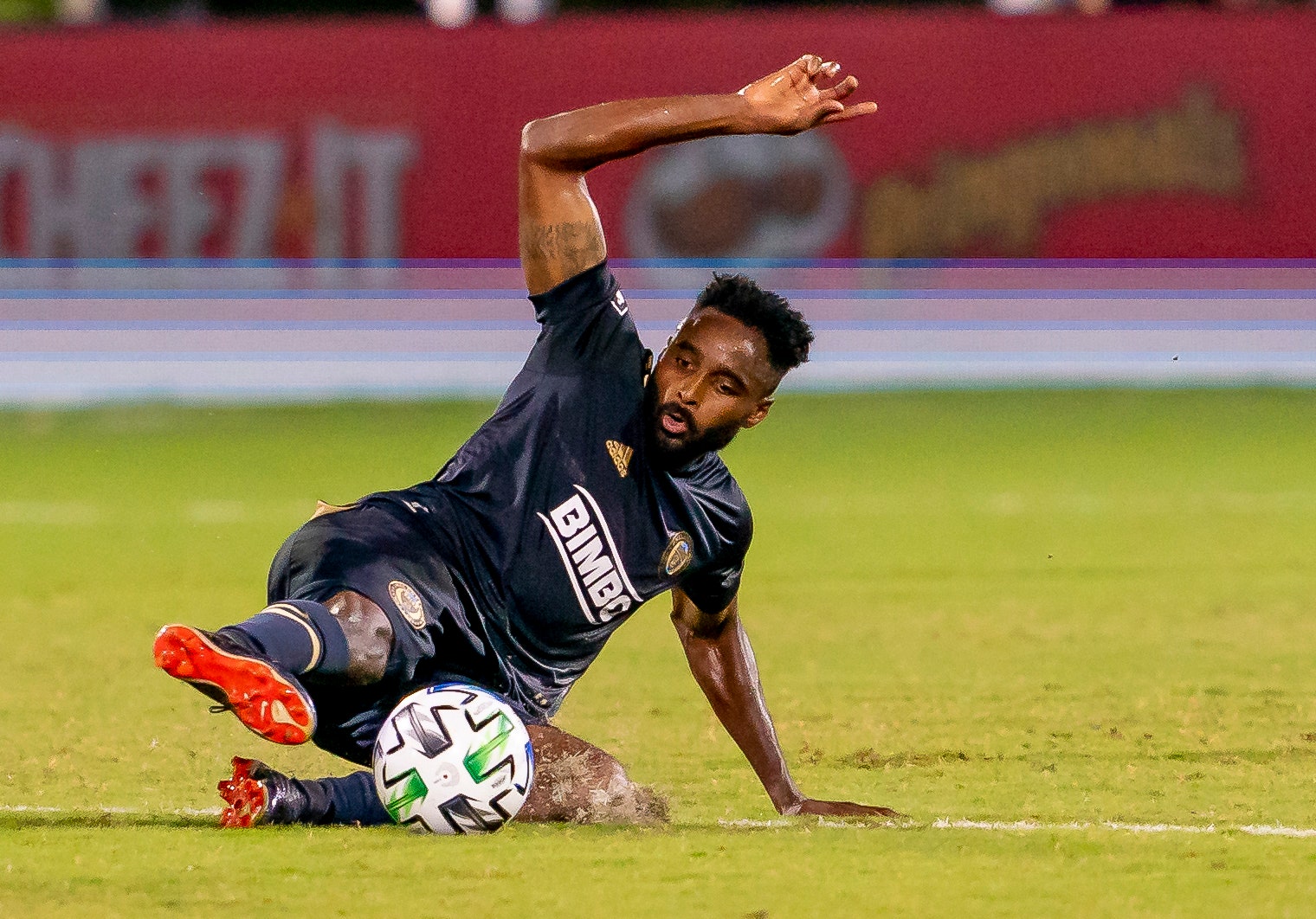He kept up his window shopping after the Dynamo drafted him out of Central Florida in 2012, though now he could act on his desires a little more often. He’d ride
his bike to the now-closed boutique The Class Room and engage in something a little more detailed than just shopping. “He was going to look at different fabrics and textiles at manufacturers across Houston after training, which was definitely not a common thing for MLS rookies to do,” Carr says. Creavalle was traded to Toronto FC in July 2014, and eagerly took in that city’s fashion influence, particularly a slimmer cut kind of T-shirt.
Creavalle in his past life, as a member of the Philadelphia Union.
Getty ImagesWith his career on solid ground, he started branching out: along with his cousin, Stephen, he founded CREAVALLE, turning out French terry logo tees and selling them at an Atlanta pop-up, with leftover stock sold online. His teammate Ashtone Morgan, another fashion head, soon became a partner. By the time he was traded to the Union, in August 2015, he knew what he liked to wear, and what he wanted to design. The next step was to share. The first CREAVALLE pop-up shop, in Philly’s North Liberties neighborhood, was supported by his Union teammates in 2017, piggybacking off of momentum from successful Atlanta and Toronto pop-ups. Philadelphia’s proximity to New York City extended the brand’s growth, as Creavalle often took the train to absorb the city’s culture—boutiques, cafes, you name it—for more inspiration before heading to Stephen’s place in Brooklyn to churn out more concepts. Soon, pop-ups popped up there, too.
Creavalle knows nothing will ever fully replace soccer in his heart, but it’s easier to move on because his heart never only belonged to soccer. This transition, as well as becoming a dad to two-month-old Naomi, has shifted his perspective on what matters. “With professional sports, you have to realize that it’s not just going out and playing,” he says. “It’s not going out to the park and playing 5-a-side with your boys. There’s a lot of extra shit that comes with it that you have to mentally endure day in and day out. A lot of people don’t make it professionally because of that.” With time, what he’s realized is that the same is true of his creative work. “As it stands right now, CREAVALLE is like playing 5-a-side in the park, still. I can say with certainty that CREAVALLE has fed me in a way soccer can’t.” He’s ready to commit the all-the-time energy to the brand he used to reserve for his day job.
Lately, that means getting lost for hours in rabbit holes about why one font translates better aesthetically than another and cultivating community. He has used CREAVALLE to repurpose his coming-of-age arc into relatable entry points. The company’s initial tagline was “L’equipe a Domicile,” translating to “The Home Team,” and most of the clothes were soccer-adjacent. Their popular satin jacket has three white squiggles on the back to represent Guyana’s three main rivers—Creavalle’s father emigrated from Guyana, and he has played for the national team—and the brand is devoted to emphasizing immigrants’ courage. Later capsules—such as Cartoons/Cereal, a nostalgic play on the way he spent his pre-soccer Saturdays, and Transience, a colorful nod to transcending life’s rigors—have drifted away from sport and into more sentimental territory.
Moving forward, Creavalle is figuring out ways to share his interests with the next generation: he founded the after-school program Design FC in Chester, Pennsylvania, which helps grade-schoolers express themselves through designing soccer kits. He’s not giving up on the work he started last summer, either. On the last day of Black History Month, the brand dropped a shirt made during those Black Players For Change brainstorm sessions. They sold out immediately.
Athletes often speak of the identity crisis that can accompany walking away from the game and, by extension, the only life they’ve ever known. Creavalle doesn’t have those concerns yet—because, the way he sees it, he isn’t really retired. More than anything, he feels like his life’s work is just beginning. For as far as back he can remember, he was programmed to have tunnel vision for athletic glory. Now, he defines his championship pursuits differently. “Any time we produce something then release it for consumption, there’s that feeling of, OK, is this gonna resonate? If it does, those are what feel like wins on a Saturday,” he says.

